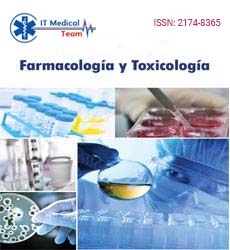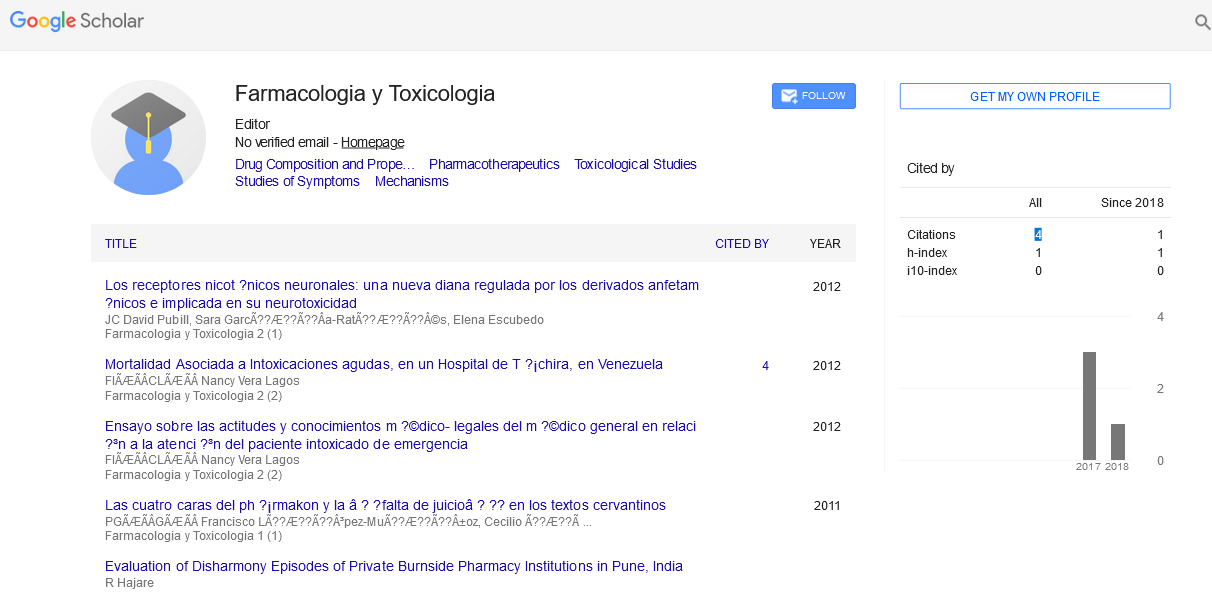Perspective - (2024) Volume 14, Issue 1
Understanding Pharmacology: A Cornerstone of Medication and Pharmaceutical Sciences
Afsaneh Mojra*
Department of Pharmacology, University of Fabrez, Bahman Boulevard, Iran
*Correspondence:
Afsaneh Mojra, Department of Pharmacology, University of Fabrez, Bahman Boulevard,
Iran,
Email:
Received: 10-Jan-2024, Manuscript No. IPFT-24-14467;
Editor assigned: 15-Jan-2024, Pre QC No. IPFT-24-14467 (PQ);
Reviewed: 29-Jan-2024, QC No. IPFT-24-14467;
Revised: 07-Feb-2024, Manuscript No. IPFT-24-14467 (R);
Published:
15-Feb-2024
Introduction
Pharmacology, a dynamic and ever-evolving field, plays a
pivotal role in the realm of medication and pharmaceutical
sciences. It serves as the cornerstone for understanding how
drugs interact with the human body, their mechanisms of action
and the therapeutic effects or potential adverse reactions they
may elicit. As an interdisciplinary science, pharmacology draws
upon principles from biology, chemistry, physiology and
pathology, contributing significantly to the development,
optimization and safe utilization of medications. This article
explores the fundamental aspects of pharmacology, its
importance in healthcare and its integral role in shaping the
landscape of pharmaceutical sciences.
Description
Defining pharmacology
At its core, pharmacology is the study of how chemicals,
specifically drugs, interact with living organisms. It encompasses
a broad spectrum of knowledge, ranging from the identification
and isolation of active compounds to the understanding of their
effects on the human body. Pharmacologists explore the
Absorption, Distribution, Metabolism and Excretion (ADME) of
drugs, seeking to unravel the intricate processes that govern
their pharmacokinetics and pharmacodynamics.
Pharmacokinetics refers to how the body affects a drug,
encompassing absorption, distribution, metabolism and
excretion. On the other hand, pharmacodynamics involves the
study of how a drug affects the body, exploring its mechanisms
of action and potential side effects. The synergy between
pharmacokinetics and pharmacodynamics is crucial for
determining the right drug dosage, frequency of administration
and the overall efficacy and safety of the treatment.
Importance of pharmacology in healthcare
Drug development and discovery: Pharmacology is
instrumental in the drug development process, from the
identification of potential therapeutic agents to their clinical
application. Pharmaceutical scientists leverage pharmacological
principles to explore natural sources, chemical libraries and biotechnological methods to discover new drugs. This involves
understanding the molecular pathways and targets that drugs
can interact with, paving the way for the development of novel
and more effective medications.
Personalized medicine: Advancements in pharmacogenomics,
a branch of pharmacology, have led to the concept of
personalized medicine. This approach tailors drug treatments to
an individual's genetic makeup, allowing for more effective and
targeted interventions. Pharmacogenomic studies help identify
genetic variations that may influence an individual's response to
specific drugs, leading to personalized dosage regimens and
minimizing the risk of adverse reactions.
Drug safety and adverse reactions: Pharmacology plays a
crucial role in evaluating and predicting the safety profile of
drugs. Understanding the potential adverse reactions and side
effects allows healthcare professionals to make informed
decisions about the risks and benefits of a particular treatment.
This knowledge is vital for designing clinical trials, monitoring
drug use in real-world settings and implementing regulatory
measures to ensure patient safety.
Therapeutic monitoring: Pharmacological principles guide the
monitoring of therapeutic drug levels in patients. This is
particularly important for drugs with a narrow therapeutic
window, where maintaining precise concentrations is critical for
efficacy and avoiding toxicity. Therapeutic drug monitoring
involves regular assessments of drug levels in biological fluids,
helping healthcare providers optimize dosage regimens for
individual patients.
Pharmacology in pharmaceutical sciences
Formulation development: Pharmacologists collaborate with
pharmaceutical scientists in the development of drug
formulations. Factors such as the drug's physicochemical
properties, stability and bioavailability are considered during
formulation development. The goal is to create dosage forms
that ensure optimal drug delivery, allowing for predictable and
reproducible therapeutic outcomes.
Quality control and assurance: Pharmacology contributes to
the establishment of quality control and assurance protocols in
pharmaceutical manufacturing. Ensuring the consistency and
purity of drug formulations is essential for their safety and efficacy. Pharmacological testing methods are employed to
assess the quality of raw materials, intermediate products and
final drug products, helping to maintain high standards in
pharmaceutical production.
Regulatory compliance: Pharmacology plays a key role in
meeting regulatory requirements for drug approval and
marketing. The data generated from pre-clinical and clinical
pharmacological studies are submitted to regulatory agencies
for evaluation. These agencies assess the safety and efficacy
profiles of drugs before granting approval for their
commercialization. Compliance with regulatory standards
ensures that pharmaceutical products meet established criteria
for quality, safety and effectiveness.
Challenges and future directions in pharmacology
While pharmacology has made significant strides in advancing
healthcare, it faces ongoing challenges and opportunities for
growth.
Drug resistance: The emergence of drug-resistant pathogens
and cancer cells poses a formidable challenge to pharmacology.
Understanding the mechanisms of drug resistance and
developing strategies to overcome it are critical for maintaining
the efficacy of existing medications and improving treatment
outcomes.
Integration of technologies: The integration of emerging
technologies, such as artificial intelligence and pharmacogenomics, holds immense potential for advancing pharmacology.
Predictive modeling, data analytics and precision medicine
approaches can enhance drug discovery, optimize treatment
regimens and improve patient outcomes.
Global health disparities: Addressing global health disparities
requires a comprehensive understanding of pharmacological
principles in diverse populations. Factors such as genetic
variations, environmental influences and socioeconomic factors
contribute to variations in drug responses among different
ethnic groups. Research in pharmacogenomics and
pharmacokinetics can help bridge these gaps and promote
equitable access to effective healthcare.
Conclusion
Pharmacology is undeniably integral to the fabric of
medication and pharmaceutical sciences. Its multidisciplinary
nature and continuous evolution contribute to the discovery of
new drugs, the optimization of treatment regimens and the
assurance of drug safety. As healthcare continues to advance,
pharmacology will play a pivotal role in addressing emerging
challenges, embracing technological innovations and fostering a
more personalized and effective approach to patient care. The
collaborative efforts of pharmacologists, pharmaceutical
scientists and healthcare professionals will shape the future
landscape of pharmacology, ensuring that it remains at the
forefront of advancements in medicine.
Citation: Mojra A (2024) Understanding Pharmacology: A Cornerstone of Medication and Pharmaceutical Sciences. Farmacologia Toxicologia
Vol.14 No.1





